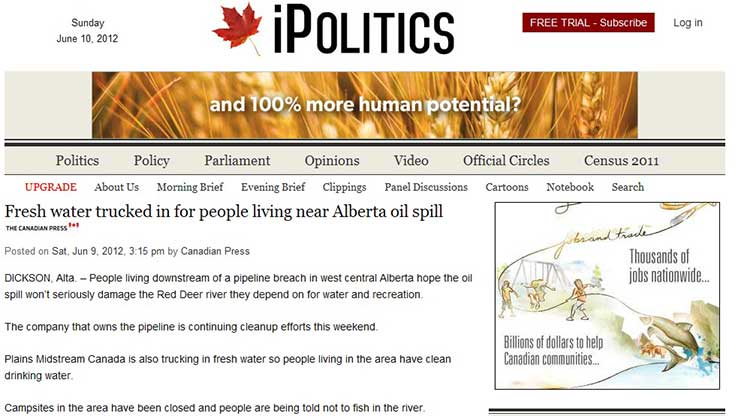The Conservative Party of Canada are sickening hypocrites on free speech.
Hate speech is OK. Green speech is not.
Hate speech is permitted, for it is “free speech.” “Green speech,” on the other hand, is under constant attack from the Conservatives and their followers. While not subject to legal curbs (for now), we are seeing increasing pressure on those who advocate for the environment to shut up.
The Conservatives today repealed sections of the human rights act concerning “hate speech” delivered by telephone and the Internet. There was a free vote, the Conservative MPs supported the repeal by 153 to 136. It was a private members bill from Alberta Conservative MP Brian Storseth that repealed Section 13 of the human rights code, which covered with complaints regarding “the communication of hate messages by telephone or on the Internet.”
On the same day, in SunMedia, that Prime Minister Stephen Harper says his government will no longer fund any organization that comes before the Northern Gateway Joint Review opposing the pipeline.
According to Sunmedia story Taxpayer Funding Oil-Sands Activitists
The taxpayer tap pouring cash into the coffers of oilsands opponents could be turned off.
“If it’s the case that we’re spending on organizations that are doing things contrary to government policy, I think that is an inappropriate use of taxpayer money and we will look to eliminate it,” said Prime Minister Stephen Harper in Paris on Thursday.
Harper was responding to reports by Sun News Network that the Canadian Environmental Assessment Agency has showered more than $435,000 on groups participating in the review of the Northern Gateway pipeline proposal, that would connect Alberta’s oilsands to a tanker port in northern B.C.
So there we have it, a prime minister who heads a government elected by just 30 per cent of the Canadian electorate, who now decides who can afford to come before a public quasi-judicial body, the Northern Gateway Joint Review Panel. Support the government and the bitumen sands, fine, we’ll give you taxpayers’ dollars, even if you don’t need it. Oppose the government, and you do it on your own dime.
Transnational energy companies have millions to spend to support their views on the oils sands, whether before the JRP or in a multi-million PR campaign. A poor community that could be devastated by an oil spill off the BC Coast doesn’t count.
In the age of the web, Facebook, Twitter and other social media, all speech is hard to control, as despotic governments around the world are finding. Hate speech on the Internet is impossible to control. All someone has to do is have a server in a country like the United States, where the First Amendment permits it. Green speech will continue to be free on the Internet. The difference is that Conservatives are making every effort to make green speech ineffective in the political and public spheres in Canada.
The change in the Canadian hate law means little in a practical sense. So why did the Conservatives change the law? Like their efforts to crush “green speech,” repealing those hate speech clauses has absolutely nothing to do with free speech. The repeal is all about ideological control, the very opposite of free speech.
Behind this vote is the fact that conservatives have made it clear over the years that they despise human rights codes. Today’s act of repeal is nothing more than part the Conservatives wide-ranging plan to incrementally, millimetre by millimetre, (probably through other private member’s bills) to dismantle all the progress that has been made in this country over the past 70 years.
The right wing media loves to promote the far out wacko cases of people who use the human rights law process, stories the right-wing repeats again and again. There have been wackos who use other legal procedures, including the civil courts and other judicial and quasi-judicial bodies. But the conservatives and their media allies only emphasize the wacko cases before a human rights tribunal.
Of course, the majority of comfortable (and most of whom are, as far as we know, white, male and straight) conservatives are never going to have to use a human rights tribunal to redress a grievance. They were never beaten up on the school yard, never denied a job or housing. Most of the people who go before human rights tribunals are on the margins of society.
At the same time, we see the ongoing campaign by conservatives to demonize “green speech,” speaking out for the environment. Conservatives, in politics and the media, are trying to curb the funding of foundations that support the environment, the government routinely calls environmentalists “radicals” and even “terrorists.” Now we have Harper saying, yet again, don’t you dare oppose government policy on the bitumen sands.
The right-wing media routinely heaps their scorn and yes, even hatred, for those who believe that life on this planet is threatened. Those right wing columnists will, of course, fight to death to protect their own free speech but most won’t even put in a single sentence of objection in their columns or reports about the conservative campaign against “green speech.”
Which brings us to the man, who while claiming to be a free speech advocate, is actually now the self-appointed head of Canada’s thought police, Ezra Levant of Ethical Oil. (Ethical Oil today triumphantly tweeted Harper’s statement @EthicalOil Taxpayers funding anti-oilsands activists #EthicalOil #Cdnpoli… fb.me/V1AS7Tg2 )
Writing in the National Post, Jonathan Kay is full of praise for Levant:
a vigorous network of right-wing bloggers, led by Ezra Levant, began publicizing the worst abuses of human-rights mandarins…. In absolute numbers, the readership of their blogs was small at first. But their existence had the critical function of building up a sense of civil society among anti-speech-code activists, who gradually pulled the mainstream media along with them. In this sense, Mr. Levant deserves to be recognized as one of the most influential activists in modern Canadian history.
Influential activist, yes. Free speech advocate? No. It is time the media stopped calling Levant a champion of free speech. He is not. Levant is a champion of causes he himself approves of, especially the bitumen sands. Free speech for anyone who opposes his agenda is subject at very least to attack and ridicule.
In his columns, Levant advocated the curbing of the free speech of the thousands of people of British Columbia who are defending their back yard from the energy industry. Levant is, of course, free to disagree with them, but don’t you dare oppose Ezra Levant or the bitumen sands,
Levant, rather than calling for more free speech in his columns, as his personal PR spin maintains, advocated cutting off the people who live here in northwestern British Columbia from the hearings of the Northern Gateway Joint Review panel, by saying too many people had signed up to testify.
Writing in SunMedia on December 10, 2011, Levant let off a broadside at the thousands of ordinary Canadians living and working along the route of the Northern Gateway pipeline who signed up to comment on the project, calling on Stephen Harper to fire chair Sheila Leggett for permitting too many people to speak at the hearings
[A]s of Friday, 4,453 people had typed in their names into Leggett’s website, signing up for the right to make a presentation.
[The JRP] allows anyone in the world — literally any person, any child, any foreign citizen — to simply type their name and address and get the right to testify before her panel.
It’s as trivial as clicking “like” on a Facebook page. That’s why Leggett needs another year. If another 40,000 people click on her website, will she delay things 10 years?
Skimming through the names is like reading petitions where wiseacres sign up as “I. P. Freely” or “John A. Macdonald.” Much of it is just junk, to jam up the system.
The website allows people to write a comment. Many of them are word-for-word replicas of each other. It’s a form letter campaign, arranged by professional environmental lobbyists. And it’s working. The only question is whether Leggett is naive, incompetent or biased against the pipeline.
Some of the forms have been faxed in. They helpfully have the fax signature stamp at the top of the page, showing which foreign-funded lobby group is working to gin up names. Like the Sierra Club, which received a $909,000 contract from the U.S. Tides Foundation and their Canadian affiliate to gin up opposition to the “tar sands.”
Those foreign billionaires are getting their money’s worth — they’ve managed to delay the hearings by a year before they’ve even started.
Levant was giving a completely inaccurate account of the Joint Review process. His column which echoes the ideological blindness of most his conservative columnist colleagues, speaks of foreign influence, repeating the big lie being propagated by the Conservative party, started largely by blogger Vivian Krause, that there is an International California Conspiracy to undermine the Canadian energy industry.
Dealing with a pipeline coming through some of the most geologically unstable country on the planet is not “trivial.” The threat of a major oil spill on the British Columbia coast is not “trivial.”
I’ve attended, listened to the remote webcast or read the transcripts of much of the hearings. None–none– of the testimony can remotely be considered: “Much of it is just junk, to jam up the system.”
A fair estimate would say that 95 per cent of people who registered to comment live along the pipeline route or the BC coast. At least a dozen or more letters of comment are posted on the JRP site every day, which means thousands since Levant wrote the diatribe, and it is clear that they are written by individuals with valid concerns, and none in recent months are form letters. (I check them, I doubt if Levant does)
In that column, Levant goes on about JRP chair Sheila Leggett:
She’s Stephen Harper’s bureaucrat, but she’s taking direction from foreign meddlers. For “whatever time it takes.”
What a fool. No court would permit such a gong show. And Leggett has court-like powers.
Last month, when Barack Obama delayed the Keystone XL pipeline from the oilsands to the U.S., Harper was appalled.
But Leggett was appointed by Harper. And she just pulled an Obama on our own country.
Leggett must be fired. Her job is not to listen to everyone in the world with an Internet connection. It’s to make the best decision in Canada’s interest.
Her Oprah-style hearings are unacceptable, and Harper should make that clear by sacking her.
Leggett was not fired. In fact, over the past six months, she has had a difficult time confining testimony to the narrow rules of evidence that do not permit someone to actually say they oppose the pipeline. An intervenor had to testify “from personal knowledge” or if First Nations “from traditional knowledge.” So no hearings came close to being “a gong show.”
There hasn’t been a single “foreign meddler” testify in the past six months (although some intervenors, including the energy companies themselves, use experts from outside Canada).
In a later column, on January 7, 2012, the weekend before the hearings began here in Kitimat, Levant again toed the conservative party line in Pipeline review hearings allowing foreign input is ridiculous — we don’t need another country’s permission. It’s all Canada, Levant again repeated his big lie.
Those who testified at the Kitamaat Village hearings in the following days were from the Haisla Nation as well as Douglas Channel Watch and the Kitimat Valley Naturalists (both groups consist of mainly retired Kitimat residents). There wasn’t a foreign billionaire in sight. Same with the hearings in the days and weeks that followed, First Nations, fishers, hunters, guides, birders, and yes environmental groups. (How dare those BC NIMBYs get in the way of an Alberta pipeline and its manifest destiny?)
In today’s SunMedia article, Environment Canada cautioned:
A spokesman for Environment Minister Peter Kent tells QMI Agency while that funding is often legally required, Kent wants to make sure “common sense prevails” in how it’s awarded.
With its majority, it is likely the Conservatives will change the rules, just as they are by abolishing DFO fisheries protection for salmon spawning streams. Again bottom line, if you support the government and you are rich, you can testify. If you are poor, even if you are “directly affected,” tough luck.
The sad fact is that Levant has won, for now, his fight against free speech in BC, probably without knowing it.
More and more people are dropping out of the Joint Review Panel process, hearings scheduled for days now last just a day or an afternoon. That’s because given the position of Stephen Harper, Joe Oliver and Peter Kent, that the pipeline is going ahead no matter what, many of these people who signed up to comment now see no reason to testify for 10 minutes on a subject that is a foregone conclusion. Here in the northwest, where long distance travel is concerned, it takes time and money to make the effort of participate. Why testify, if the government is going to ignore the concerns of the people who live here?
No wonder Ethical Oil sent out the celebratory tweet this afternoon.
The Conservatives have won a major in battle in their war on free speech in this country by making it not worth their while for many ordinary citizens, those who don’t have deep pockets for research and lawyers, to speak on the Northern Gateway Pipeline, at least before the Joint Review Panel. Now Harper government wants to cut off funds for the poorer intervenors. If that happens, more opponents will drop out of the proceedings.
Kay, in his attack on the hate law calls it a “system of administrative law that potentially made de facto criminals out of anyone with politically incorrect views about women, gays, or racial and religious minority groups.”
The National Post’s conservative friends (in its own newsroom and both in and out of Parliament) are now looking for ways to make “defacto criminals out of anyone with the politically incorrect” view that the Northern Gateway Pipeline is not a new version of the “national dream.” After all, Stephen Harper’s statement today means “that doing things contrary to government policy” is now politically incorrect.
Of course, if the pipeline breaches along the Kitimat River and the town is without a drinking water system for up to four years (in the worst case scenario), it will be Kitimat’s nightmare, not Canada’s. (In Don Mills, columnists will still be able to drink Toronto’s water or, perhaps, run to the corner store for a Perrier.) If a bitumen tanker hits the rocky coast and sinks in the deep cold-water fjords, it will largely be BC’s nightmare, and the BC taxpayers’ nightmare, not Edmonton’s or Toronto’s. If a pipeline buried under nine metres of west coast snow in a remote valley has a small–undetectable by computer– breach in the darkest days of January and the ongoing oil leak isn’t discovered for weeks or months, by that time it might also be “politically incorrect” for anyone Canada to object. (Of course, people in the region will object and strongly).
The fact is that these small c and large C conservative campaigns against hate laws in terms of “free speech” are nothing more than the rankest hypocrisy. What most (not all) conservatives want is free speech for their ideas and only those ideas, especially if they want to shout their own hatred of certain groups from the rooftops or on the world wide web, while at the same time, many conservatives have been trying to shut down anyone with opposing views.
To a conservative, the freedom of speech and the freedom of religion that still drives too many numbers of gay teenagers to suicide, is always protected free speech, no matter the body count.
On the hand, to the same conservatives, free speech in Canada doesn’t include protecting the environment of the only planet we live on, especially if a small portion of the funding that speech comes from California. In conservative Canada, free speech belongs to American (that is foreign) oil billionaires like the Koch brothers. To conservatives, free speech does not apply to local BC groups, coalitions of often left-wing environmentalists and often conservative anglers and hunters, trying to protect wild salmon.
Where’s George Orwell when we need him? In the Canada of Stephen Harper, the National Post and Sunmedia, homophobic hatred is protected, preserving the planet is not protected. In Canada in 2012 (or I should I say 1984+), the only acceptable political speech is support for the bitumen sands and the pipeline projects.
And you wonder why the public has such contempt for majority of politicians and most of the media?
Related links:
Editorial: Just asking: why didn’t anyone object to the Americans at the NEB LNG hearings in Kitimat?
Joint Review media analysis Part one: Calgary Herald columnist advocates curbing free speech on the Northern Gateway Pipeline hearings
(Deborah Yedlin of the Calgary Herald was another columnist who advocated limiting the number of people appearing before the Joint Review Panel. Perhaps this is another case of free speech for Albertans, but not people in BC?)



